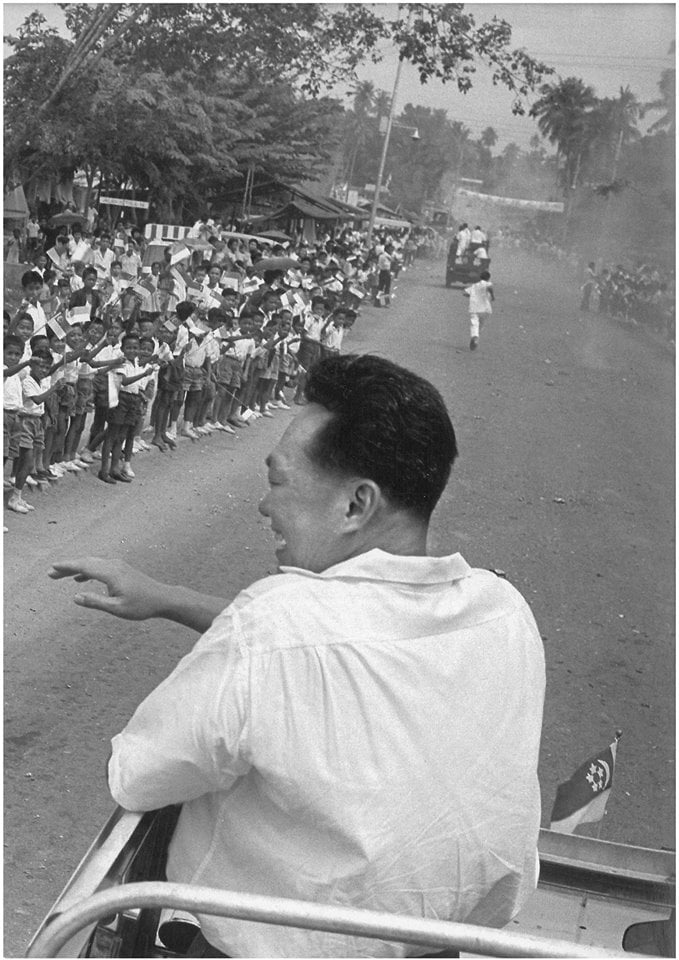- Joined
- Jul 14, 2008
- Messages
- 89,988
- Points
- 113
What exactly was the East Coast Plan? Planting some trees? Environmental nonsense? That's it?
His wife may be regretting her efforts to plant this longan tree.

What exactly was the East Coast Plan? Planting some trees? Environmental nonsense? That's it?




The eulogy clearly resonated with Singaporeans and received over 1,700 shares.For Mr Lee Kuan Yew, Singapore has been a lifelong preoccupation. Mr Lee’s deep and abiding belief is that who we are as Singaporeans will shape the kind of future that we will have.
HSK : MY ECP is to run away. Ha ! Ha !

Comment: Heng Swee Keat is no longer PM-in-waiting. Will East Coast voters care?
How will East Coast voters react to this latest development?
Sulaiman Daud |
April 10, 2021, 08:27 PM
Once again, thanks to Heng Swee Keat's shocking announcement of April 8. the hottest reality show in Singapore is back on the air. Who will be Singapore's Next Prime Minister?
The last time I can remember someone in a top spot giving it up for other contenders was WWE pro wrestler Edge, who gave up his World Championship due to injuries.
A younger me shed a tear that day. Screenshot from WWE YouTube.
But let's leave the hot takes about the next Prime Minister-in-waiting for now. After all, we likely won't get a clearer picture until the next Cabinet reshuffle, scheduled to take place in about two weeks.
Instead, let's consider the implications of Heng's move on the electoral prospects of East Coast Group Representation Constituency (GRC).
From Tampines to East Coast
Let's rewind to 2020. In the last General Election, Heng moved out of his Tampines GRC "stronghold" and went to East Coast GRC, a switch that caught observers flat-footed.
Now Heng was not the only PAP MP to stand in a different constituency as compared to 2015. Nor was he the only Cabinet minister to pull up stakes, with Minister Desmond Lee moving from Jurong GRC to West Coast GRC to take on the challenge by Tan Cheng Bock's Progress Singapore Party team.
Perhaps the opposition presence was a factor behind the move. Observers noted that the Workers' Party (WP) fielded a team widely-perceived as one of their best after Aljunied GRC.
With Minister Lim Swee Say and Senior Minister of State Lee Yi Shyan retiring, East Coast needed a heavyweight. They got Heng.
Heng explained that PAP cannot afford a gap in East Coast in these uncertain times, so he told PM that he will move to East Coast.
You can quibble over Heng's performance in his new GRC -- and we'll get to that shortly -- but the fact remains that when the dust settled he managed to keep East Coast in the column of the Men and Women in White.
Now the question is -- with the latest development -- can he do so again in the next election?
The tale of the tape
Let's delve into the numbers. Heng and his team won with 53.39 per cent of the vote.
One way to look at it is to compare this with East Coast in 2015, which the PAP won with 60.73 per cent.
So that's a downturn of 7.34 per cent. At this point, some people conclude that Heng and his team weren't strong performers in GE2020.
But in 2020, the overall swing against the PAP, on the national scale, was 8.66 per cent. So Heng and his team bucked the trend and did better than the party as a whole.
As Mothership previously noted, what made this achievement more impressive is that East Coast GRC absorbed Fengshan Single Member Constituency, where the WP put up a strong fight in 2015.
Out of the six contests where the PAP squared off against the WP, three won and three lost. Heng and the East Coast team might have been the lowest performing of the three winners, but they were still winners.
And if you pooled all the votes for the PAP and the WP from the six constituencies, the WP had a slight edge with 50.49 per cent to 49.51 per cent.
Heng and the East Coast team performed 3.88 per cent better, by this comparison.
Pic from Mothership.
Not bad for a guy in a new environment.
The East Coast Plan will go ahead
Let's assume Heng does stay on in East Coast for the next GE, presumably in 2025. It's important to remember that while he may have stepped aside as 4G team leader, and will step down as Finance Minister in a couple of weeks, he remains a Member of Parliament and a Deputy Prime Minister.
So all those questions about what's going to happen to the renowned East Coast Plan? Nothing much, it's still going ahead.
Heng said as much to reporters from the Straits Times on April 9, that "nothing has changed", and added:
"We told them, the residents of East Coast have given us a mandate. And we have promised them we will work to build a vibrant, caring and green East Coast.
The five of us will work together with all of them, and with our residents to carry out what we have promised, and to serve our residents to the best of our ability."
In his Facebook post today (Apr. 10), Heng said that he spoke with and listened to East Coast Party activists for about two hours on Friday night.
He said that his commitment to his East Coast residents remains the same and he will continue to do his best to serve his residents.
Heng had all of nine days to introduce himself to East Coast voters, walking the ground both night and day.
With the benefit of five years under his belt, and with more time to get to know the voters of East Coast once the Finance portfolio is taken off his hands, Heng might very well do better next time round.
Challenges for Heng the candidate
Minister without a ministry
You're unlikely to find this term on official documentation, but the PAP has long practised a strategy of having an "anchor" candidate, almost always a minister, to helm a GRC.
The logic is simple. Each PAP team has a Cabinet minister to serve as the point man or woman. Voters are reminded that if they vote for the opposition, the Cabinet risks losing an office-holder.
PM Lee said as much following WP's victory in Sengkang, calling it a "major loss" to his team with Ng Chee Meng, Amrin Amin and Lam Pin Min out.
Heng was undoubtedly the anchor for East Coast GRC going into the election. But he did so as the Finance Minister.
Will the voters care that he won't be helming a ministry of his own? Edwin Tong, who was not a Cabinet minister at the time, referred to Speaker Tan Chuan-Jin as the "anchor" for Marine Parade even though Tan was not helming a ministry.
It might be instructive to check out the other GRCs in GE2020 with similar anchors with no ministerial portfolio.
Jurong - Tharman Shanmugaratnam, Senior Minister and Coordinating Minister for Social Policies (74.61 per cent)
Marine Parade - Tan Chuan-Jin, Speaker of Parliament (57.74 per cent)
Pasir Ris-Punggol - Teo Chee Hean, Senior Minister and Coordinating Minister for National Security (64.16 per cent)
It shows that voters are willing to vote for a team with an anchor not personally in charge of a ministry.
Are the East Coast residents concerned?
Residents who spoke to CNA said that it was a "pity" to see Heng step aside from the position but seem quite neutral about his decision.
Reinforcements
After the election and after the latest reshuffle, some candidates in these constituencies, along with East Coast, received promotions to full minister.
Edwin Tong of Marine Parade was promoted to Minister for Culture, Community and Youth.
Maliki Osman of East Coast was promoted to Minister in the Prime Minister's Office, as well as Second Minister for Education and Foreign Affairs.
Tan See Leng of Marine Parade was made a Minister in the Prime Minister's Office, as well as Second Minister for Manpower and Trade & Industry.
With Maliki as a full minister to back up Heng, East Coast might be a stronger ground for the PAP in the next GE.
And of course, it's not out of the question that there could be more moves to East Coast, or more portfolio shuffles. Or Heng might once again be called on to move out of his GRC, and go somewhere else. But it's likely that WP will still contest East Coast fiercely in the next election.
Next Prime Minister?
But there's a cloud on the horizon.
Beyond his Finance portfolio, and his status as Deputy Prime Minister, East Coast voters were undoubtedly aware that Heng was slated to become the next Prime Minister.
His WP opponent Nicole Seah said as much during the election, terming it a "personal dilemma" for voters choosing between backing the opposition or the PM-in-waiting.
The knowledge that they held the future of the PAP's succession plans in their hands must have weighed on the mind of at least one East Coast voter.
Now that Heng has effectively taken himself out of the running to be the next PM, and giving up the Finance portfolio, how will that play with the voters in the next election?
After all, Sengkang has shown that the loss of office-holders is not an insurmountable barrier.
The 2025(?) revive
"But Sulaiman," you may very well be saying (or not, I can't hear you), "2025 is a long way away. A lot of things can happen!"
Well yeah. Five years ago, no one had heard of a President Trump, Liverpool FC were still in their title drought and Thanos wasn't a household name.
Who knows what could happen five years from now. The polar ice caps could have melted, the robot revolution could have begun, or an asteroid could smack into the Earth.
But assuming there's still a Singapore in 2025, and there are Singaporeans around to vote, and there is an East Coast GRC for them to vote in, and it comes down to another rematch between the PAP and the WP, Heng and Seah (or not), white and blue...
That's gonna be a rematch for the ages.
Top image from Heng Swee Keat's Facebook page.
If you like what you read, follow us on Facebook, Instagram, Twitter and Telegram to get the latest updates.

Win is all tat matters. Close is uselessNicole Seah and her team will run them very close next GE.
Win is all tat matters. Close is useless

His wife may be regretting her efforts to plant this longan tree.



